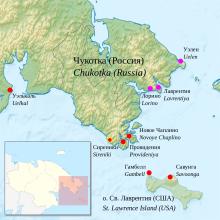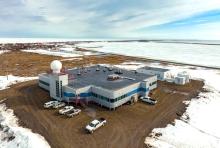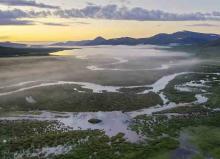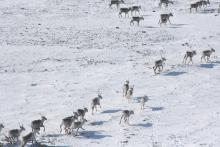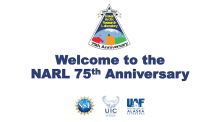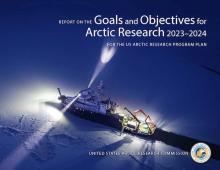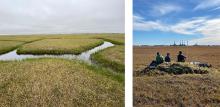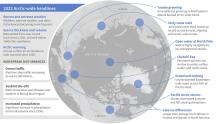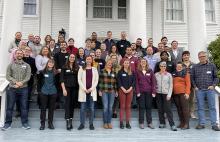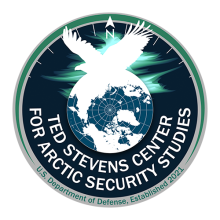Witness Community Highlights is an online publication launched in May 2017 to complement the regular publications of Witness the Arctic. It was developed in response to community feedback identifying the need for a monthly publication to highlight 1–2 Arctic research efforts and other timely items of interest to our readers. Community Highlights is distributed monthly via our Witness the Arctic mailing list of over 8,600 subscribers.
Assessing Ice Wedge Micro-Topography Interactions with Environmental Parameters in Alaska through Family Friendly Science
Winter thermal contraction cracking and subsequent spring meltwater infiltration produce the ice wedge polygons prevalent in Arctic terrestrial permafrost systems. Point measurements of physical characteristics and carbon dioxide and methane fluxes in low- and high-centered ice wedge polygon sites enable a better understanding of micro-topography ecosystem processes and of the environmental responses to degrading permafrost.
By Melissa Ward Jones, Institute of Northern Engineering, University of Alaska Fairbanks
Understanding the Long-term Changes in the Arctic Carbon Balance
The NSF supported research group at San Diego State University has used eddy covariance to track Arctic carbon and methane fluxes to gain knowledge of the multi-decadal patterns in these green house gas fluxes. This knowlege is critical to understanding the response to climate variability and long-term change in the carbon balance in the Arctic. Among their findings is that earlier snowmelt is associated with more tundra net carbon sequestration and higher plant productivity only in June and July, but with lower net carbon sequestration and lower plant productivity in August.
By: Donatella Zona, San Diego State University (SDSU) Kyle Lunneberg, SDSU and University of California Davis; and Walter C. Oechel, SDSU
Harmful Algal Blooms in the Alaskan Arctic—a WCH Science Short Video
In this new Witness Community Highlights video feature Evie Fachon, Anderson Lab, Woods Hole Oceanographic Institution, talks about her work researching Harmful Algal Blooms (HABs) in the Arctic and their impact on the health of the ecosystem and local communities.
By: Evie Fachon, Anderson Lab, Woods Hole Oceanographic Institution
A 50,000-Year History of the Bering Land Bridge Revealed Through the Marine Nitrogen Cycle and Sea Level Modeling
An interdisciplinary team of Earth scientists has dated the formation of the Bering Land Bridge to 36,000 years ago, within 10,000 years of the last ice age peak. This new date greatly shortens the window of time during which Asia and North America were connected, with implications for understanding ice sheet and sea-level history, past terrestrial migrations, and the causes of cyclic ice ages.
By: Jesse Farmer, University of Massachusetts Boston and Tamara Pico, University of California Santa Cruz
Arctic Community Observations and Western Science Document Impact of Climate Change on Food Security
With widespread environmental changes, communities relying on sea ice for harvesting marine mammals in the winter and spring face unpredictable conditions, shortened harvesting seasons, decreased harvesting opportunities, and travel safety concerns impacting access to resources. The Alaska Arctic Observatory and Knowledge Hub (AAOKH) is a network of Iñupiaq observers in northern coastal communities working in partnership with UAF researchers to track Arctic environmental change and its impact on the subsistence calendar.
By: Roberta Tuurraq Glenn, Alaska Arctic Observatory and Knowledge Hub (AAOKH) Project Coordinator and Community Liaison and Donna Hauser, AAOKH Science Lead
Developing a Framework for Arctic Agroecology
Agricultural development in the North American North has historically contributed to the loss of Indigenous food sovereignty through ecosystem degradation, loss of traditional harvesting practices, and an increased reliance on food imports. The author and colleagues propose a uniquely northern framework for Arctic agroecology that applies ecological concepts to food systems management.
By: Mindy Jewell Price, PhD Candidate at the University of California at Berkeley
The Indigenous Foods Knowledges Network
The NSF-supported Indigenous Foods Knowledges Network (IFKN) brings together Indigenous leaders and academics from the Arctic and sub-Arctic and the US Southwest to exchange knowledge about Indigenous food systems and the local efforts that sustain them. Community members share local strengths, solutions, and innovations to produce culturally relevant food locally in spite of various disruptions, shocks, and systemic challenges.
By: Noor Johnson, University of Colorado Boulder; Mary Beth Jager, University of Arizona; Stephanie Russo Carroll, University of Arizona; Eva Dawn Burk, Tlaa Deneldel Community Group, Orville H. Huntington, retired; Lydia L. Jennings, Arizona State University; Kaare Sikuaq Erickson, Ikaaġun Engagement; Max Taylor, Natwani Coalition; Dan Ferguson, University of Arizona
Reflections on the Displacement of Yupik in Chukotka
Luda Kinok shares reflections on the historical and ongoing impact of displacement, war, hunger, and disease on survival of the culture, language, and traditional subsistence economies of the Yupik in Chukotka.
By: Luda Kinok, Sighineghmiit Immigrant to Alaska
New Partnership Between IARPC and UIC Science
The Interagency Arctic Research Policy Committee (IARPC) announces that IARPC's Secretariat is now supported by UIC Science, a subsidiary of the Ukpeaġvik Iñupiat Corporation (UIC), the Alaska Native Corporation representing shareholders from the community of Utqiaġvik, Alaska. Their expertise encompasses Traditional Knowledge, technical and logistical support, project management and strategic planning, Indigenous community outreach, and science support while understanding the politics, culture, land use issues, regulations, and environmental conditions related to scientific research in Alaska.
By: Liz Weinberg, Interagency Arctic Research Policy Committee (IARPC) Engagement Director
Arctic Beaver Observation Network—Tracking a New Disturbance Regime
The Arctic Beaver Observation Network (A-BON) is a group of scientists, Indigenous groups, land managers, and local observers who are concerned about the expansion of beaver populations into Arctic landscapes. This collaboration, funded by NSF's Office of Polar Programs, began in 2020 and assembles a broad range of perspectives from circumarctic nations to coordinate research and observations related to beaver colonization of the Arctic and the impacts it is having on ecosystems and people.
By: Ken Tape, University of Alaska Fairbanks
Sediment, Ice, and Learning on the Tanana (SILT) River
The Sediment, Ice, and Learning on the Tanana (SILT) project is centered on developing and testing low-cost sensor networks that can be deployed in the Tanana River when it is ice covered to better capture full sediment fluxes to downstream ecosystems. Additional new learning about silt and ice is coming from working with K–12 students in Nenana and Fairbanks, Alaska, who help in sensor construction, testing methods, and envisioning new hypotheses.
By: Emily Eidam, Oregon State University; Christopher D. Arp, University of Alaska Fairbanks (UAF); Julianne Davis, University of North Carolina (UNC); Allen Bondurant, UAF; Sarah Clement, UAF; Lillian Marguerite Cooper, UNC; Ted Langhorst, UNC; Tamlin Muir Pavelsky, UNC; and Katie Spellman, UAF
Doing Ethnography and Engaging with Indigenous Alaskan Communities Based on Ethnographers’ Identities
While conducting ethnographic fieldwork with partnering communities in the Arctic, this team of social scientists recognized that their roles as participant observers were slightly different because of their identities. They came to understand that their identities could help in learning insider perspectives about the distribution of whale meat during Qagruq (Whale Festival) in Tikiġaq (Point Hope), Alaska.
By: Michael Koskey and Yoko Kugo, Center for Cross-Cultural Studies, Indigenous Studies Graduate Programs, University of Alaska Fairbanks
Greenland's Largest Ice Stream Likely to Lose Ice Six Times Faster than Thought
An interdisciplinary team combined field measurements, satellite observations, and numerical modeling to discover that the Northeast Greenland Ice Stream was much more sensitive to the intrusion of warm water along the coast than what was previously thought. Their work helped identify how the ice slides on the bedrock. This new knowledge led to a revised assessment of the future mass loss of this sector, which is six times higher than previous estimates.
By: Mathieu Morlighem, Department of Earth Sciences, Dartmouth College and Shfaqat Abbas Khan, DTU Space, Technical University of Denmark, Denmark.
Improving the Arctic Observing Network in a Changing Environment: A Report Summary
The Interagency Arctic Research Policy Committee (IARPC) and the United States Arctic Observing Network (US AON) Board released a report to Congress on 13 December 2022 describing the need for a sustained Arctic Observing Network. The report recommends that sustained and enhanced Arctic observations will contribute invaluable information to global models and forecasts, national security decisions, community resilience efforts, health and well-being, and economic prosperity.
By: Hazel Shapiro, Program Analyst at US Arctic Observing Network (US AON) and Interagency Arctic Research Policy Committee (IARPC); Sandra Starkweather, Executive Director, US AON; Thorsten Markus, Cryospheric Science Program Manager, NASA; and Olivia Lee, former Program Director, Arctic Observing Network Office of Polar Programs
Reflections on a Recent Conference Session: Alaskan and Arctic Anthropology Since Russia's Invasion of Ukraine
Since Russia's invasion of Ukraine on 24 February 2022, ethnographic research in Chukotka has not been possible. A recent conference session was organized to focus on the direct relevance that the suffering and displacement of millions of people in Ukraine and in Chukotka has for Arctic social sciences. Although the war and Putin's regime will eventually come to an end, the future of the social science research in Russia has possibly reached a "turn of no return" due to the fact that hundreds of Indigenous hunters, reindeer herders, culture, language, and knowledge bearers will be gone.
By: Sveta Yamin-Pasternak, Department of Anthropology, University of Alaska Fairbanks and Igor Pasternak, Department of Art, University of Alaska Fairbanks
Caribou Migrations in a Changing Arctic
In early August 2022, a multidisciplinary, intergenerational, and cross-cultural group of more than 140 participants converged on Utqiaġvik, Alaska to celebrate the 75th Anniversary of the Naval Arctic Research Laboratory (NARL) and to take part in an NSF funded workshop focused on Enhancing Arctic Science and Engineering. The workshop, grounded in a legacy of promoting sustainable Arctic science in Utqiaġvik, was guided by the important role of the Iñupiat in furthering scientific understanding of climatic and social-ecological change in the rapidly changing Arctic. The post-workshop report will help plan for the coordination of future Arctic research efforts and identify logistical and facility needs.
By: Kyle Joly, Wildlife Biologist, National Park Service
Celebrating 75 Years of Arctic Research in Utqiaġvik, Alaska
In early August 2022, a multidisciplinary, intergenerational, and cross-cultural group of more than 140 participants converged on Utqiaġvik, Alaska to celebrate the 75th Anniversary of the Naval Arctic Research Laboratory (NARL) and to take part in an NSF funded workshop focused on Enhancing Arctic Science and Engineering. The workshop, grounded in a legacy of promoting sustainable Arctic science in Utqiaġvik, was guided by the important role of the Iñupiat in furthering scientific understanding of climatic and social-ecological change in the rapidly changing Arctic. The post-workshop report will help plan for the coordination of future Arctic research efforts and identify logistical and facility needs.
By: Benjamin M. Jones, Institute of Northern Engineering, University of Alaska Fairbanks on behalf of the Workshop Organizing and Advisory Committee
USARC Releases Report on the Goals and Objectives for Arctic Research 2023–2024
The United States Arctic Research Commission has released its "Report on the Goals and Objectives for Arctic Research 2023–2024." The Report focuses on five goals: Environmental Risks and Hazards; Community Health and Well-Being; Infrastructure; Arctic Economics; and Research Cooperation. In addition, the Report emphasizes a cross-cutting theme of data analytics and informatics, considers the impact of COVID-19 on the Arctic region, and highlights select emerging topics in the region.
By: Isaac Edwards, Senior Counsel, United States Arctic Research Commission
New Observatory Supports Broader Understanding of Climate-Change and Infrastructure Impacts to Ice-Rich Permafrost Systems
The NSF Navigating the New Arctic project, titled "Landscape Evolution and Adapting to Change in Ice-Rich Permafrost Systems (NNA-IRPS)" seeks to develop a broader understanding of how Arctic landscapes and ecosystems are evolving under the combined influence of climate change and local sources of disturbance. The project team established ice-rich permafrost observatories to study ground-ice conditions in relation to surficial geology, vegetation, other geoecological features, and disturbances. The Roadside Ice-Rich Permafrost Observatory (RIRPO) and the Natural Ice-Rich Permafrost Observatory (NIRPO) are in the Prudhoe Bay Oilfield. Research at the new NIRPO site investigates what has happened in areas of the oilfield that are mainly affected by climate change in the absence of infrastructure.
By: Donald A. Walker, Alaska Geobotany Center, Institute of Arctic Biology, and Department of Biology and Wildlife, University of Alaska Fairbanks
The 2022 Arctic Report Card
The 2022 Arctic Report Card, released on 13 December 2022, provides an updated annual view into the state of the Arctic by checking in on key vital signs — eight defining elements of the Arctic's climate and environmental system. The report also includes a range of essays on critical and emerging topics across the Arctic, bringing into focus diverse collections of observations that help to assess the overall trajectory of Arctic change, highlighting an Arctic in transition.
By: Matthew L. Druckenmiller, National Snow and Ice Data Center and Cooperative Institute for Research in Environmental Sciences, University of Colorado Boulder; Rick Thoman, Alaska Center for Climate Assessment and International Arctic Research Center, University of Alaska Fairbanks; and Twila A. Moon, National Snow and Ice Data Center and Cooperative Institute for Research in Environmental Sciences, University of Colorado Boulder
International Arctic Coastal Networks Connecting in Connecticut
The International Arctic Coastal Network (IACN) retreat, held in Mystic, Connecticut in mid-October 2022, brought together 42 researchers from eight different countries to focus on the unprecedented climate and land use change issues impacting Arctic coasts and the communities located there. Future Arctic coastal system dynamics will challenge conventional wisdom impacting human decision-making and adaptation planning, impacts to cultural heritage resources and communities, and likely resulting in unforeseen social and environmental challenges. The IACN retreat promoted synergy across networks to address the scale and complexity of future challenges.
By: Benjamin Jones, University of Alaska Fairbanks
IARPC Releases Arctic Research Biennial Implementation Plan 2022—2024
IARPC has released a companion for the Arctic Research Plan 2022—2026. The new implementation plan outlines 90 deliverables centered around supporting research, creating products, and coordinating information sharing. Like the Arctic Research Plan, the Biennial Implementation Plan 2022—2024 focuses on improving community resilience and well-being, advancing scientific understanding of ongoing changes in the Arctic system, creating more sustainable economies and livelihoods, and improving risk management and hazard mitigation.
By: Liz Weinberg, Interagency Arctic Research Policy Committee (IARPC) Engagement Director
Permafrost Pathways Project: Advancing Just Strategies to Address Arctic Warming
Permafrost Pathways is an ambitious new project that brings together scientists, Arctic residents, Indigenous Knowledge holders, environmental justice and human rights experts, and climate policymakers to improve permafrost science in collaboration with the international scientific community, and to inform and develop adaptation and mitigation strategies to address the hazards of permafrost thaw. The project addresses monitoring and modeling gaps as well as potential adaptation strategies and equitable mitigation policy.
By: Sue Natali, Arctic Program Director and Senior Scientist at Woodwell Climate Research Center and Project Lead for Permafrost Pathways, and Brendan Rogers, Associate Scientist at Woodwell Climate Research Center and Project Co-Lead for Permafrost Pathways
Decadal Review of the Long-Term Ecological Research Program
The Fourth Decadal Review Report on the Long-Term Ecological Research (LTER) network was released publicly in June 2022. The report discusses the strengths and challenges of the LTER network, summaries of findings, and includes recommendations from the committee. The report states that, "After more than forty years of sustained support from NSF, the LTER program has become one of the most highly regarded and successful programs in ecology." Response to the report, approved by the LTER Executive Board in October 2022, summarizes recent progress and plans in four focal areas from the review: diversity, equity, inclusion, and justice; synthesis; human-environment interactions; and education and outreach.
Editor's note: Text is excerpted from the LTER Network Response to the Fourth Decadal Review Committee Report
The Ted Stevens Center for Arctic Security Studies — Newest Regional Center of the US Department of Defense
The Ted Stevens Center for Arctic Security Studies, a Department of Defense (DOD) Regional Center established by the Secretary of Defense in June 2021, is located on Joint Base Elmendorf-Richardson in Anchorage, Alaska. The mission of the Stevens Center is to build strong, sustainable, domestic and international networks of security leaders and to promote and conduct focused research to advance DOD security priorities in the Arctic that include addressing the impacts of climate change in the region. The range of activities, seminars, symposiums, and products produced in support of that mission are highlighted in this article.
By: Maj. Gen. (Ret.) Randy "Church" Kee, USAF, Senior Advisor, Arctic Security Affairs, Ted Stevens Center









